Brexit: How would no-deal affect Northern Ireland?
- Published
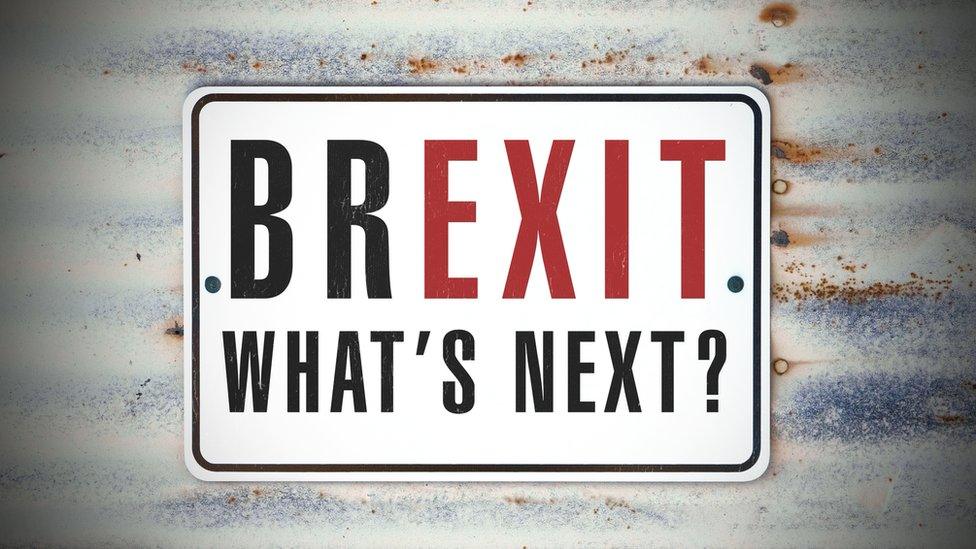
Tick tock, tick tock. Brexit day looms large on the horizon.
Prime Minister Boris Johnson says he is planning to leave the European Union on 31 October, come what may.
The political rhetoric from London has toughened and divisions appear to have intensified.
Parliament has rejected leaving without an agreement, but with little sign of compromise and no request from the government to Brussels for a Brexit deadline extension, politics is tumbling towards an, as yet, unknown endgame.
If no-deal does occur, what will it mean for a range of everyday activities in Northern Ireland, like grocery shopping, filling prescriptions, mobile phone coverage and energy bills?
Food shopping:
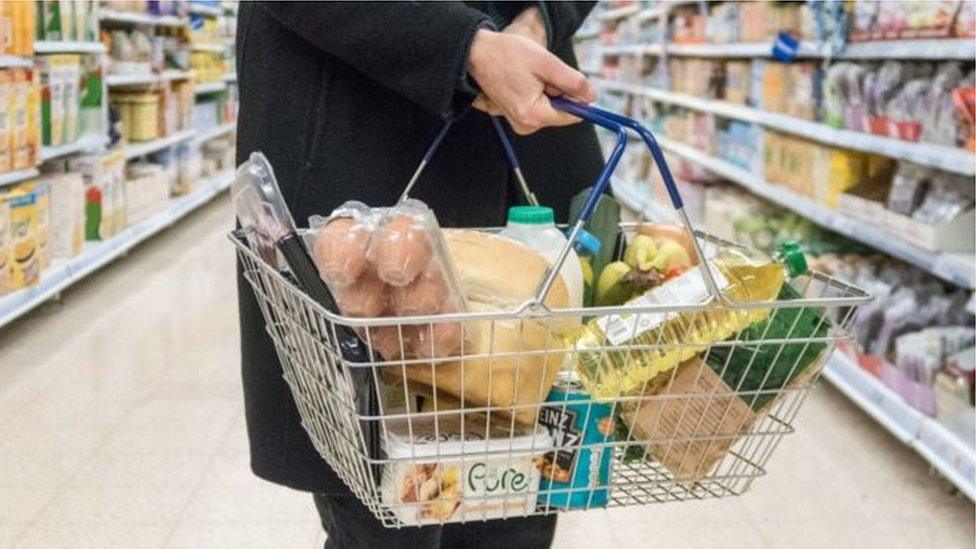
A no-deal Brexit throws up a range of potential problems for the retail industry, but let's focus on just one area - food.
Industry representatives in Northern Ireland were quick last month to challenge Michael Gove, the minister in charge of no-deal planning, after he said there would be no fresh food shortages in a no-deal exit.
Mr Gove said "everyone will have the food they need" in the event the UK leaves the EU without a deal.
Michael Gove: 'Everyone will have the food they need'
That's not true, argues Aodhán Connolly of the Northern Ireland Retail Consortium (NIRC).
He says stockpiling can only go so far and the UK is reliant on supplies from mainland Europe for certain fresh fruits and vegetables.
"You can't stockpile fresh produce," he says.
"There's not even enough storage space for the frozen stuff."
28%of UK food comes from the EU.
70%of tomatoes.
86% of lettuces.
27%of soft fruit.
Retailers have warned of the potential for shortages.
Mr Connolly says if the country leaves on 31 October without a deal, little will change for shoppers on 1 November as retailers have been storing as much as they can.
But, he adds, that won't last long.
No-deal Brexit 'may affect food supplies'
"There will also be immediate cost rises, not only in goods that we're bringing in, but also on things that we make in Northern Ireland, because a lot of them are composite products," Mr Connolly says.
*Annual figures
400,000live pigs exported from ROI to NI for processing.
400,000lambs exported from NI to ROI for processing.
800 million litresof milk exported from NI to ROI for processing.
Any potential border delays raise issues around availability and could also push up prices, he says.
"A bottle of Baileys, the ingredients have five movements across the border, before it becomes a finished bottle of Baileys," Mr Connolly says.
"A chicken salad sandwich has six border movements. The humble cottage pie has seven border movements. The milk comes from Northern Ireland, it is processed in the Republic of Ireland, and then it comes back to Northern Ireland.
"What we can say with some certainty is that there are grave concerns as far as availability, what's going to be on our shop shelves is going to be significantly different, and what it costs is going to be different as well."
When asked if food prices would increase, Mr Gove said: "I think that there are a number of economic factors in play.
"Some prices may go up. Other prices will come down."
There is also concern about the continuation of cross-border trade in things like milk, sheep, pigs and cattle.
The government's five-page Operation Yellowhammer paper, external says Northern Ireland's agri-food sector could be badly hit in a no-deal scenario, with some firms forced to stop trading and others struggling to cope with the impact of tariffs.
The Ulster Farmers' Union (UFU) has said a no deal would be "catastrophic" for Northern Ireland farming.
President Ivor Ferguson has criticised a plan that would see tariffs retained on imports to Great Britain of agricultural imports like beef, lamb, pork and poultry, but would not apply to imports from the Republic of Ireland to Northern Ireland, to prevent the need for border checks.
Foodstuffs going the other way across the border would face EU tariffs, if there is no deal.
Mr Ferguson said steep export tariffs, a zero per cent tariff on agriculture goods coming from the Republic of Ireland and increased checks and regulations will cause huge disruption, and a logistical nightmare for farm businesses.
The UFU has called for reciprocal tariffs matching the EU's on produce coming into the UK in a no deal to ensure protection for domestic production.
Farmers also fear that cheap produce from elsewhere in the world could enter the GB market, pushing down prices and making it difficult for Northern Ireland farmers to compete.
Medicines:
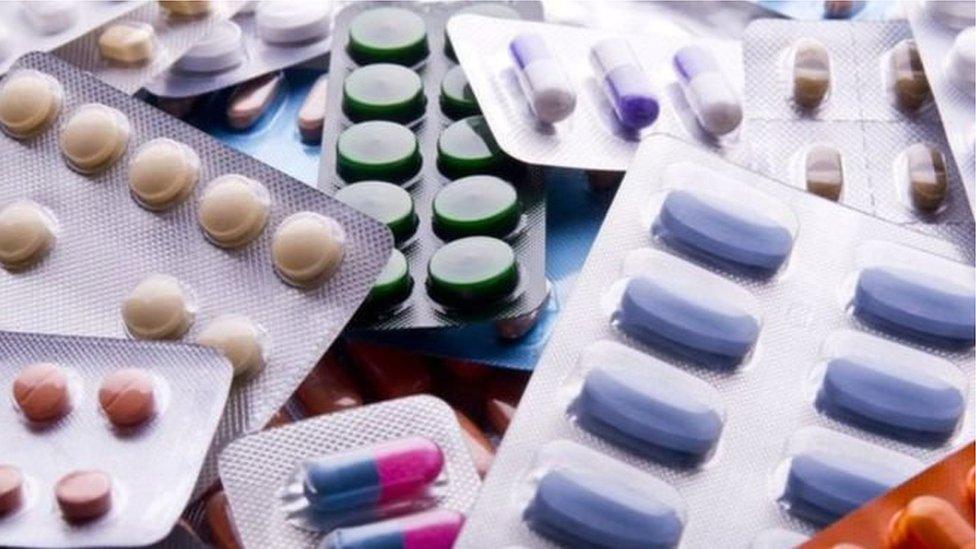
Health is another headline-grabbing issue that has attracted a lot of attention in recent weeks and months.
Last month, in a letter to the prime minister, the heads of 17 royal colleges and health charities across the UK said clinicians were "unable to reassure patients" their health and care will not be affected in a no-deal scenario.
They warned of "significant concerns about shortages of medical supplies".
It is an issue about which Dr Tom Black, chair of the Northern Ireland wing of the British Medical Association (BMA), has repeatedly expressed concern.
75%..of medicines the UK uses, come from, or via, the EU.
The Department of Health in London has said the main risk to medicine supplies is the predicted reduced shipping flows , externalbetween Calais/Dunkirk/Coquelles and Dover/Folkestone in a no-deal scenario.
About three quarters of medicines the UK uses comes from, or via, the EU and the vast majority are reliant on those crossings.
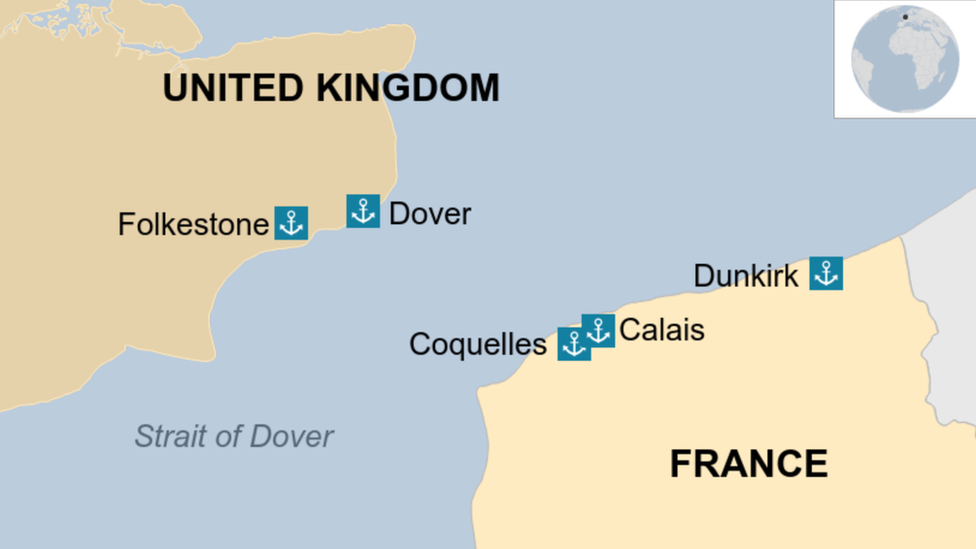
Medicine flows to the UK from EU through Strait of Dover ports
Dr Black says there is no need for patients to stockpile their medicines, as health professionals will find "workarounds" if supply problems do occur.
But he adds: "We obviously worry particularly about patients we would consider at high risk, and the typical one would be the diabetics who require insulin, because you can't do without insulin if you're a type 1 diabetic."
It's not my job to alarm the public, but it is my job to point out concerns about provisions of services in the future."
He says there are about one million diabetics in the UK requiring insulin.
"All of it is imported through the European Union, and much of it is made in France and Denmark," he says.
"I don't think that we could last very long without ongoing supplies of insulin."
Pharmaceutical companies have been told to build up stockpiles of six weeks' supply of drugs.
Novo Nordisk, which manufactures insulin, told the BBC last month that it had 18 weeks' worth of supplies in the UK and had secured ferry capacity to renew stocks.
He says there are also concerns around the availability of radioisotopes. Radioisotopes are radioactive atoms that can be used against cancer and are a key component of some types of scan.
About one million patients in the UK receive medical radioisotopes for diagnosis or therapy each year.
Dr Black says patients will not immediately see the effects of a no-deal Brexit, although he adds problems with supplies of radioisotopes could be prevalent within days.
The Department of Health said "action is being taken to safeguard supplies".
"I fully appreciate that there are smart people working hard on this, but there will be unknown unknowns that will trip us up," Dr Black says.
"I would hope that the majority of people will get their medicines, and we will find a workaround for exceptions. It's not my job to alarm the public, but it is my job to point out concerns about provisions of services in the future.
"We would be very foolish to say everything will be alright on the night, because we're not convinced of that."
The Department of Health in Northern Ireland says the UK government is working closely with the health service and suppliers to make sure medicines and medical products continue to be available in all scenarios. , external
It has also said that cross border healthcare services should not be affected, external.
The Department of Health has reiterated that Brexit preparations do not require anyone using health and social care services to do anything new or different, nor, it says, is there a need for patients to change the way that they order their prescriptions or take their medicine, external.
Common Travel Area (CTA):
Brexit will not affect the rights of Irish citizens and UK subjects within the Common Travel Area.
The right to live, work and access public services in the CTA will be protected, regardless of the outcome of negotiations, external.
Driving:
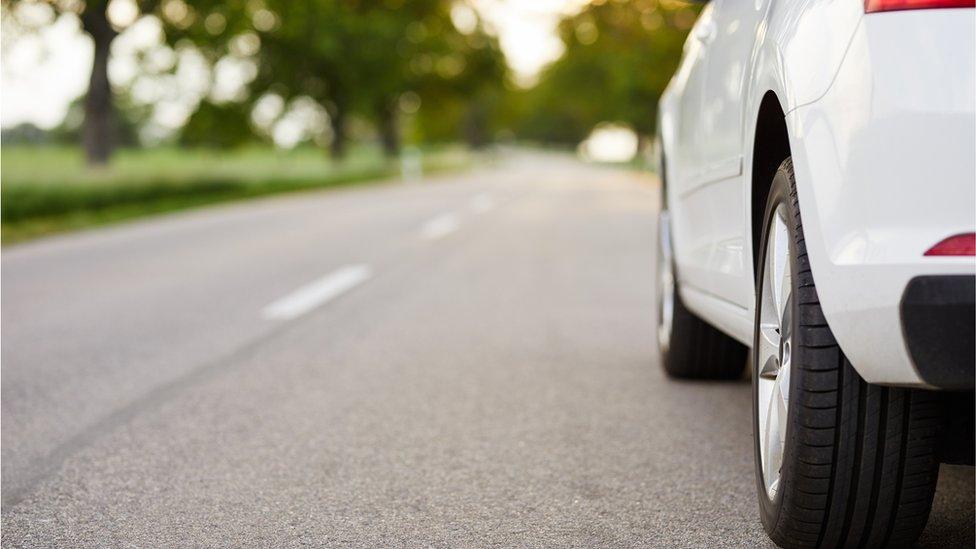
In a no-deal Brexit, UK licence holders will potentially need one or more international driving permits (IDP) to drive in Europe, depending on which country they're going to or through., external
But, they'll not need an IDP to drive when in the Republic of Ireland, external.
Northern Ireland drivers may, though, need to have an insurance green card - an international certificate of insurance issued by an insurer - when travelling to the Republic.
They are not cards in the strict sense. They are paper documents which, under current international rules, should be printed on green paper.
Those living in Ireland who hold a UK driving licence are strongly urged to act now and exchange their licence."
Owners of Irish-registered vehicles will not need a motor insurance green card to drive in the UK in the event of a no-deal Brexit.
Anyone living in the Republic of Ireland who holds a UK, including a Northern Ireland, driving licence, must exchange it for an Irish driving licence before 31 October, external, if there is a no-deal exit.
"If you wait till close to the UK exit date of 31 October, you may face lengthy delays in exchanging a UK licence, and the National Driver Licensing Service (NDLS) cannot guarantee when you will have a valid licence to drive here in Ireland," the National Driver Licence Service noted on its website.
"For this reason, those living in Ireland who hold a UK driving licence are strongly urged to act now and exchange their licence."
Other forms of travel:
In the year to the end of May, the traffic count of vehicles at the 15 main border locations topped 46.6 million, including just over 385,000 buses.
Earlier this month, the European Commission extended two regulations guaranteeing aviation and road transport connectivity between Ireland and the UK in a no-deal scenario, external.
The announcement extended arrangements for international road haulage and cross-border bus services until 31 July 2020, and aviation until 24 October 2020.

Ireland's Department of Transport said Irish Rail and Northern Ireland Railways are working together to ensure the Enterprise rail service will continue to run in a no-deal Brexit.
Cross-border ferries operating in Northern Ireland, such as the Carlingford Lough Ferry and the Lough Foyle Ferry, will not be affected. They operate on the basis of passenger ship certificates provided by authorities in both jurisdictions.
Travelling with your pet:
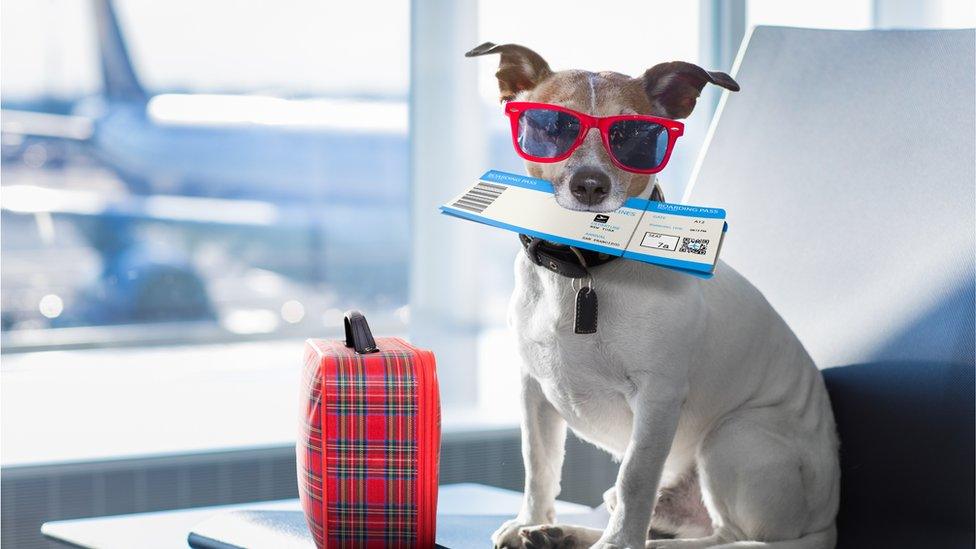
While the UK remains in the EU, you'll be able to travel with your pet to EU countries under current pet travel rules using a pet passport.
In a no-deal situation, pet owners wishing to bring their animals into the EU will need to contact a vet at least four months in advance of travelling.
Energy bills:
It's not yet clear whether electricity or gas bills here will be affected in the event of a no-deal Brexit, but the lights are expected to stay on.
Northern Ireland trades both gas and electricity with the Republic of Ireland and Great Britain through interconnectors.
The Utility Regulator said in March that this trade would continue in a no-deal scenario as would the single electricity market (SEM). That advice still stands, external.
Gas flows are also not expected to be affected.
Mobile phone coverage:
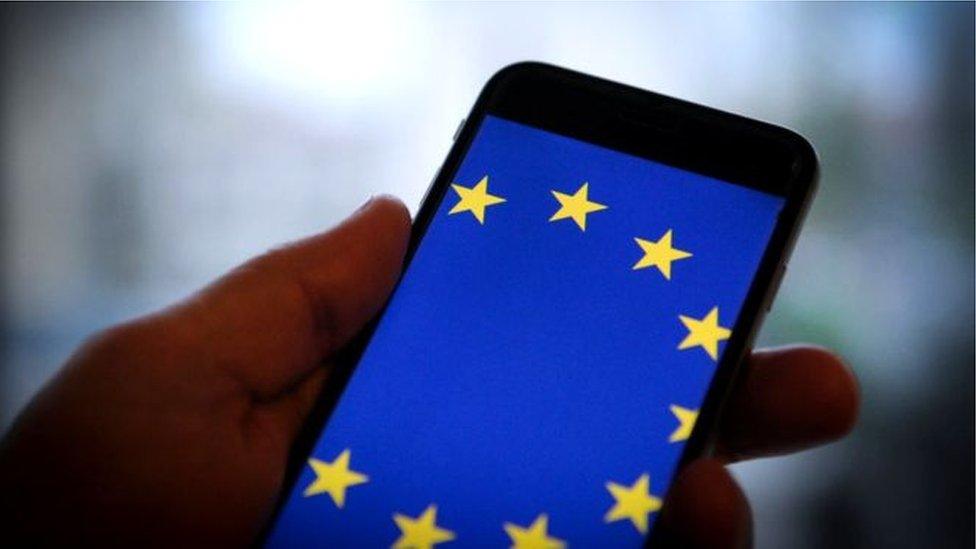
For as long as the UK remains in the EU, you can travel in EU and EEA countries without incurring roaming charges.
The government has said this can't be guaranteed in a no-deal Brexit, even though some operators do not plan to change their mobile roaming policies.
The government has warned those living in border areas of Northern Ireland, in the event that roaming charges are in place, to be aware of "inadvertent roaming", external, in which you roam on to an Irish network as the signal may be stronger from the Republic of Ireland.
"Mobile operators must take reasonable steps to protect their customers from paying roaming charges for inadvertently accessing roaming services if there's no Brexit deal," government advice recommends.
"They must also make information available to their customers on how to avoid inadvertent roaming in border regions."
Alcohol:
Colin Neill, chief executive of Hospitality Ulster, says a no-deal scenario could see the price of alcohol rise.
He says there are no World Trade Organisation (WTO) tariffs on alcohol, but there are on soft drinks.
"There are no WTO tariffs on alcohol, there are some on wine, but the core alcohol part there's not. But if you're bringing alcohol in, you have to can the stuff, there's glass, so anything packaged here would go up in price," he said.
"It's not just the tariffs, there's also the delays. If there's any transport delays, you're paying for that as well."